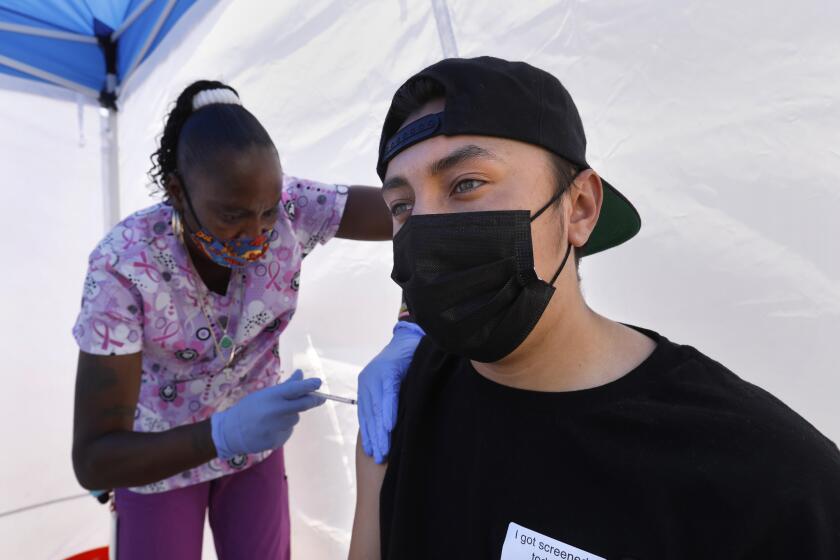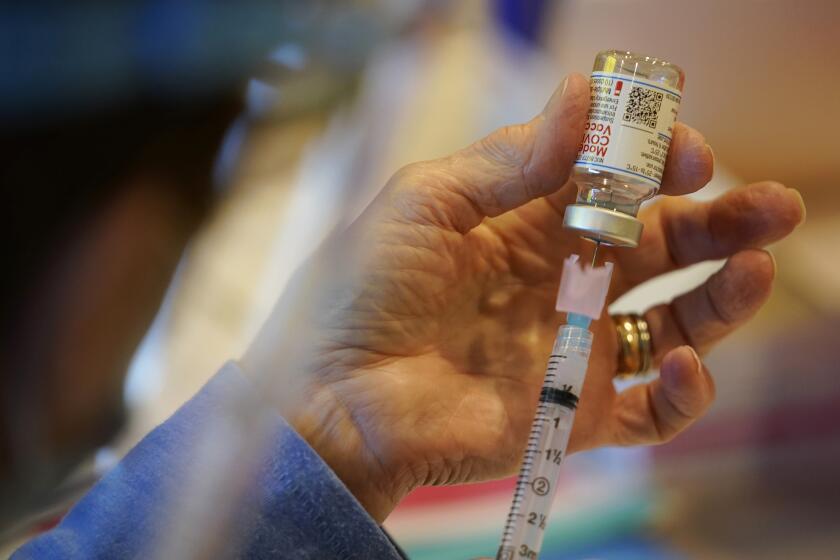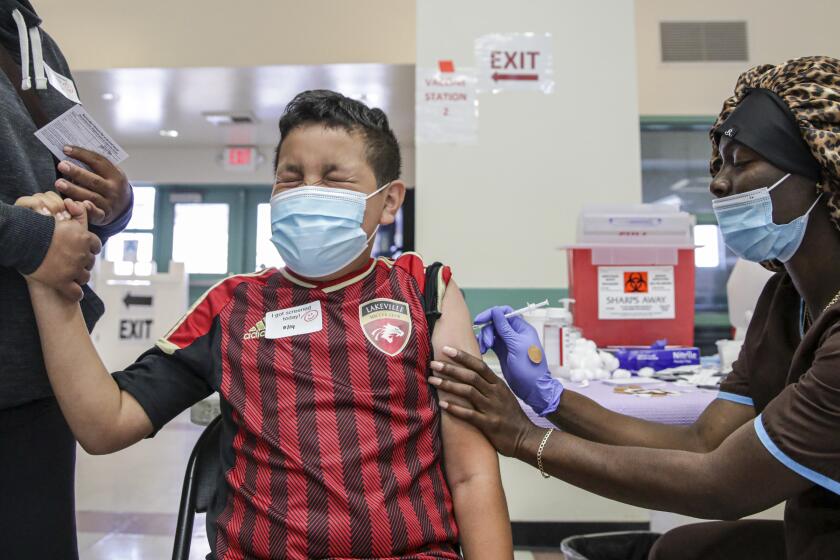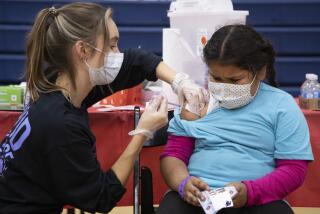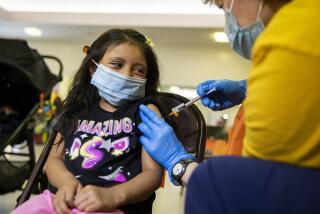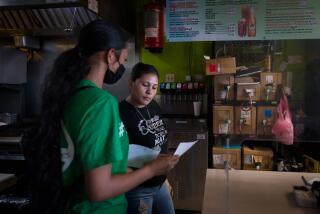Schools try mascots, food trucks and giveaways to get students vaccinated
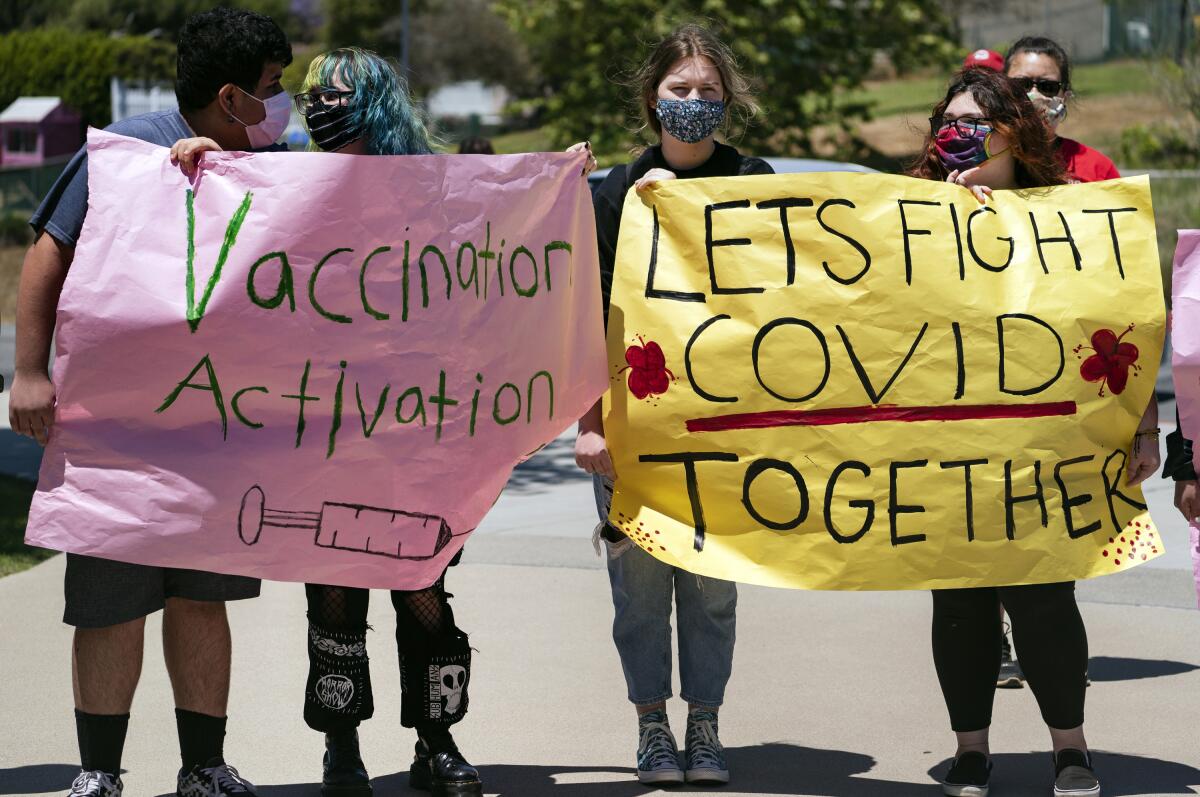
SAN DIEGO — A growing number of public schools are using mascots, food trucks and prize giveaways to create a pep-rally atmosphere aimed at encouraging students to get vaccinated against the coronavirus before summer vacation.
Districts from California to Michigan are offering free prom tickets and deploying mobile vaccination teams to schools to inoculate students 12 and up so everyone can return to classrooms in the fall. They are also enlisting students who have gotten shots to press their friends to do the same.
Officials are concerned that once school lets out, it will be even tougher to get enough teens vaccinated in time to guarantee widespread immunity on campuses.
The massive effort has just gotten underway because it was only two weeks ago that federal regulators authorized the Pfizer vaccine for children ages 12 to 15. Younger children are not yet eligible.
So far, about 14% of the nation’s 15 million kids ages 12 to 15 have received their first shot, according to the Centers for Disease Control and Prevention. Among 7.5 million teens ages 16 and 17, that number goes up to 34%, and about 22% have had both shots, according to the latest figures released Monday. The doses are scheduled about three weeks apart.
There are many challenges.
Teenagers 12 to 15 are able to get the Pfizer-BioNTech COVID vaccine starting today. No appointment is needed at L.A. County-run sites.
Depending on the state and even county, minors may be required to have a parent present to get the shot. Some parents may not be able to get away from work to do that. Others are unsure about allowing their kids to get a vaccine that was approved only for emergency use.
Protests have popped up outside schools offering the vaccine, discouraging kids who may already be nervous.
Mission Bay High School in San Diego provides an example of the mixed reaction among students.
“I’m not getting it,” said Tatum Merrill, 14, standing with friends outside a mobile vaccine clinic at the school. “It was developed too fast and is kind of sketchy. And I feel like the number of COVID cases is dying down so if everybody else has it, there may not be a need for me to have it.”
Her friend Brandon Cheeks, 15, said he wants the vaccine, but his mother is unsure. In the meantime, another 15-year-old, Laura Pilger, said she feels safer being back in school knowing that she and everyone she knows is vaccinated.
“A woman showed up and was passing out fliers that said, ‘your body, your choice,’ but the message was not very welcomed,” Pilger said. “Why wouldn’t you want to get the vaccine?”
While hundreds of colleges across the country are requiring students to have proof of vaccination to return to campus, K-12 public schools are instead trying to entice students by making the experience festive while sending fliers home to families to address the vaccine’s safety.
Moderna says its COVID-19 vaccine strongly protects children as young as 12, and will submit trial data to U.S. regulators next month.
In suburban Detroit, students in the Southfield district who show proof of vaccination will get a free ticket to the senior prom worth $80. The incentive drew protesters who said awarding the vaccinated could lead to harassment of students who haven’t gotten shots.
“We are not separating or segregating students who choose not to receive the vaccine or do receive the vaccine,” Southfield Superintendent Jennifer Green said. “We simply want to provide our students an opportunity to celebrate this milestone in their life.”
The idea won applause from Dr. Howard Taras, a UC San Diego pediatrician who consults with districts about health safety. He is also the in-house physician for the San Diego Unified School District, the second-largest in California with about 120,000 students. It has been hosting vaccine clinics at schools in communities with low vaccination rates.
The district also took part in a public service announcement with local teens who say, “We’ll be getting the vaccine, now it’s your turn.”
“I think anything that is creating buzz helps,” Taras said, explaining that vaccinating at schools has the added benefit of generating peer pressure.
The virus has spread more rapidly among teens than younger children. “But with a large portion immunized, there is much less chance of it spreading in the classrooms, on buses,” Taras said.
And more students may want to return to classrooms as a result.
While most California public schools reopened in April, fewer than half of students resumed in-person learning, according to an analysis by the nonprofit EdSource.
A parent or guardian must be present and bring the child’s photo ID with proof of age. Some places may require signing a consent form.
Many continued with online learning, while some dropped out altogether or went to private schools. Public school enrollment dropped steeply in the nation’s most populous state, falling by more than 160,000 this school year, according to the California Department of Education.
The Los Angeles Unified School District, the largest in California with about 600,000 students, plans to have a mobile vaccination team visit every middle and high school campus at least once before the school year ends June 11. The events will feature food trucks and music.
Superintendent Austin Beutner recently appeared with Wilson High School’s Mighty Mule mascot to encourage students to roll up their sleeves. He said the district is offering paid leave for district employees to get their children inoculated. Schools where more than 30% of students are vaccinated will each receive $5,000 for projects, and students can decide how the money is used.
The school-based clinics also help administer shots to hard-to-reach populations who feel more comfortable going to their neighborhood school instead of mass vaccination sites.
Maisha Cosby was motivated by a drive-through clinic at the Washington School for Girls in Washington, D.C. She held her 12-year-old daughter Maya’s hand as she got her shot. Then Cosby got hers.
“All my friends have gotten it and they’re fine, and I’m ready for her to go back to school,” Cosby said.
More to Read
Sign up for Essential California
The most important California stories and recommendations in your inbox every morning.
You may occasionally receive promotional content from the Los Angeles Times.
